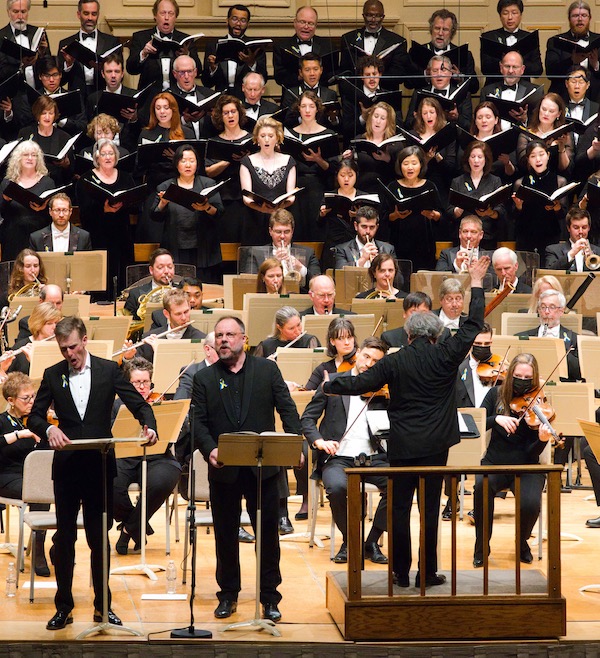Pappano, BSO and soloists mark a Britten anniversary with powerful account of composer’s “War Requiem”

Sir Anthony Pappano conducted Britten’s “War Requiem” with the Boston Symphony Orchestra and soloists Ian Bostridge, Matthias Goerne and (in center of Tanglewood Festival Chorus) Amanda Majeski. Photo: Hilary Scott
Given the classical music industry’s enthusiasm for marking anniversaries at all costs, it’s not surprising that special commemorations don’t always coincide with larger global moments. That wasn’t the case, though, on Thursday night when the Boston Symphony Orchestra and guest conductor Sir Antonio Pappano presented Benjamin Britten’s War Requiem at Symphony Hall.
Premiered sixty years ago in May, the War Requiem is Britten’s magnum opus. A testament to the composer’s humanism as well as his pacifist convictions, the score’s blend of Christian liturgy and secular commentary in the form of war poems by Wilfred Owen remains shatteringly potent. Indeed, Thursday’s well-directed reading was as notable for its expressive focus as for the clarity of the music’s stark, anti-war message.
At the heart of it all was Pappano. Conducting the BSO for the first time since 2004, his command of the Requiem’s various forces —three vocal soloists, two choirs, and two orchestras—was total.
Perhaps unsurprisingly, Pappano, the longtime music director of the Royal Opera House, Covent Garden, places the War Requiem in the lineage of Verdi’s Requiem, which is to say it’s a devotional work with a theatrical heart. Accordingly, the conductor’s approach to the score on Thursday never wanted for rhythmic tautness or intensity, all the while emphasizing the music’s bold contrasts of character, color, and texture.
The BSO responded to his leadership with playing of uncommon flexibility. The opening “Requiem aeternam,” for instance, unfolded with bracing direction, its fundamental spatial conceit—here, the angelic Britten Children’s Choir in the second balcony countering the murky, massed forces on stage—coming over with immediacy. Similarly, the “Dies irae” moved decisively, the BSO brasses intoning their recurring fanfares with rich blend and booming climaxes, while the subtle instrumental details (like the swirling woodwind lines accompanying the “Voca me cum benedictus”) flickered brightly.
Equally ear-catching was the chamber orchestra that discreetly accompanied tenor Ian Bostridge and baritone Matthias Goerne in their respective solos and duets.
Surely, there is no more sympathetic Britten singer today than Bostridge. On Thursday, he imbued his solos—particularly the “Requiem aeternam’s” “Anthem for Doomed Youth,” the “Dies irae’s” “Futility,” and the “Agnus Dei’s” “At a Calvary near the Ancre”—with a gripping mix of wonder, horror, anger, and bewilderment.
Goerne’s enunciation of the English texts wasn’t quite as precise, but he easily matched Bostridge in fervency, especially during the “Sanctus’s” nihilistic “The End” and the “Libera me’s” affecting “Strange Meeting.”
Their chemistry was most striking, however, in the “Offertorium’s” malevolent “The Parable of the Old Man and the Young.” Owen’s retelling of the biblical tale of Abraham’s near-sacrifice of his son, Isaac, ends here with Isaac being killed. On Thursday, this episode sounded truly harrowing: Bostridge and Goerne spitting out their lyrics (“one by one”) while the children’s choir on high intoned the Latin rite’s shimmering calls for “sacrifices of prayer and praise.”
Likewise impressive in her BSO debut was soprano Amanda Majeski. Singing with gleaming tone from the choir, her exhortations in the “Liber scriptus” snapped, the “Lacrimosa’s” gentle interjections mourned pliantly, and her instrument floated sweetly through the “Sanctus’s” undulating melismas.
As prepared by James Burton, the Tanglewood Festival Chorus, while largely present rhythmically, sometimes sang tentatively and occasionally sounded underpowered. A few of these issues may have been related to Pappano’s brisk tempos: the “Quid sum miser,” for instance, was breathless.
However, contrapuntal entrances, like those in the “Confutatis maledictis” and the “Offertorium’s” first “quam olim Abrahae” fugue, were periodically insecure, and there was a decided lack of volume at the “Libera me’s” queasy opening climax.
That said, the TFC sang the “Sanctus” and “Agnus Dei” warmly, and the “In paradisum” was flawlessly shaped. Additionally, the chorales that close the “Requiem aeternam,” “Dies irae,” and “Libera me” spoke with rich devotion, Pappano drawing out their concluding “n’s” to haunting effect.
Equally stirring was the combined forces’ account of the Ukrainian national anthem that began the night. Though underlining the connection between the War Requiem and the war in Ukraine verged on heavy-handedness—a Symphony Hall audience can draw such conclusions on its own—the anthem served as a timely reminder that Britten’s score is as much a lament for those killed in war as it is an anticipation of the ultimate death of war.
Benjamin Britten’s War Requiem will be repeated at 1:30 p.m. Friday and 8 p.m. Saturday at Symphony Hall. bso.org
Posted in Performances